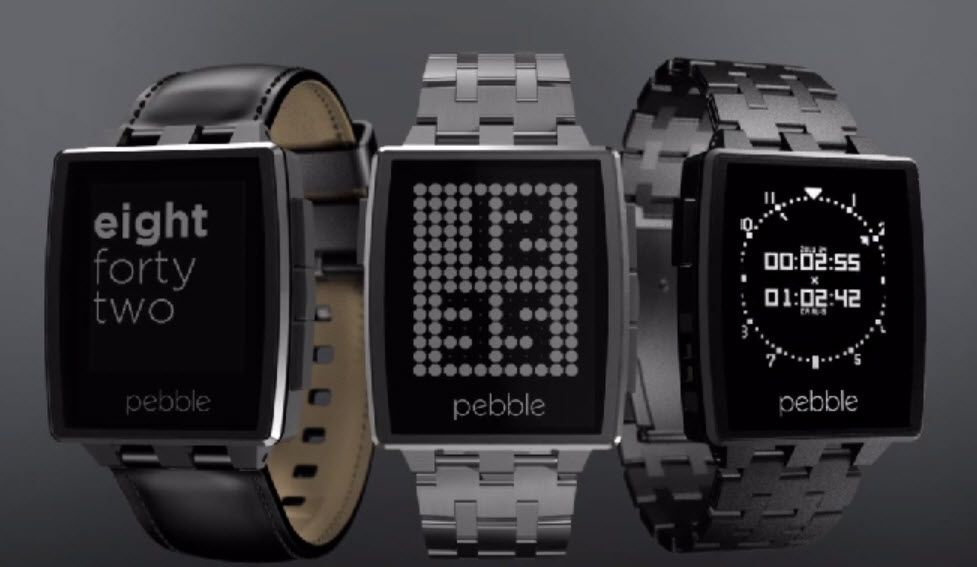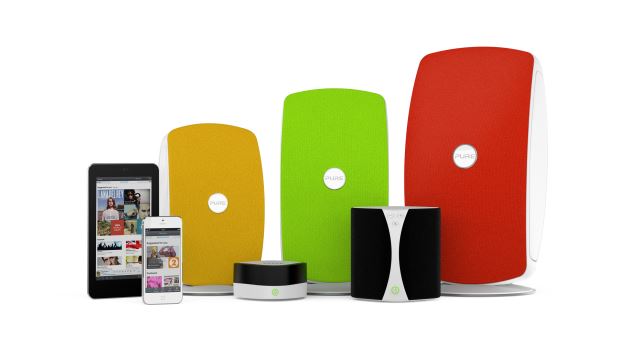
Smartphones improve the shopping experience
If you shop using your smartphone you are highly informed, social and seeking a superior shopping experience -- and retailers want to have your babies.
These (apart from the last bit) are the findings of the latest research by IDC which found that surveyed respondents believe the smartphone is transforming their shopping experience.

Google helps you stay legal, makes it easier to track down images you can use for free
There is a common misconception that anything that is made available online is fair game for use by other people. Found an image you like on a website? Why not just grab a copy and use it on your own? In some cases this is not a problem and the owner of the image will not mind others re-using imagery in whatever way they want, but this is certainly not always the case.
Google Image Search has long made it possible to filter results by the type of license they have, but now things have just got a whole lot easier.

So, what's wrong with Google making money from your information?
I'm going to let you in on a secret, something Google would love to know -- I'm a really hot guy. While my sexiness is debatable, what I mean by hot is, I tend to be sweaty. Because of this, I utilize central air conditioning to cool myself down. Apparently, this is extremely sensitive data, as the internet is in an uproar over Google's purchase of a company called Nest. The acquired company specializes in internet connected home devices, such as thermostats, and some people are scared that the search giant has crossed a line.
Yes, Google knowing how users use their thermostats is apparently the straw that broke the camel's back. While the company already has access to your emails, Google Maps data, and more, for some odd reason, this has become a rallying point. OK, so maybe the uproar is more than just thermostat data. I understand the fear of Google infiltrating your home. Guess what? You don't have to invite it in. In other words, no one is forcing you to buy an internet-connected thermostat. You can continue to work your thermostat manually, like a cave man. However, for people who want the convenience, perhaps their data is a fair trade. Nothing in life is free.

Tumblr takes a leaf out of Twitter's book, introduces @ mentions
Today Tumblr introduces a new feature that makes it easier to interact with other users of the blogging/photo-sharing/Twitter-on-steroids/sort-of-social-network service. It's something that has been done in plenty of other places, most notably Twitter and, more recently, Facebook, but Tumblr now includes the option to @mention other users. This is not a feature that is going to cause outbreaks of mass hysteria around the globe, but it is certainly useful, and brings the service in line with many of its competitors.
The idea is very simple. When writing a new post, type an @ symbol and as you continue to type, a list of suggested users will be displayed ready to select from. Any user who is mentioned in a post will receive a notification that someone is writing about them, and this opens up a new realm of interactivity for Tumblr.

Augmented reality is coming to the workplace
Unlike virtual reality, which seeks to replace the physical world with a virtual one, augmented reality aims to supplement the real world with computer input.
This might be simple, real-time stuff like displaying the score on the screen during a football match, or more advanced technology like object or facial recognition. Now though analyst company Gartner sees AR reaching a point where it can enhance business workflows and training.

Google begins its home invasion
I contacted Nest's PR late last week but heard nothing back. Now I know why. The company has been sold to Google for $3.2 billion. Quite what the acquisition means for Nest and its products long term is difficult to say -- "Nest will stay Nest" according to Nest’s CEO Tony Fadell (the "godfather of the iPod" as he’s also known) -- but it does signal an important move for Google.
The company already knows a lot about you. Depending on which of its services you use it knows what your interests are, where you go on the Internet, and (via Android) in the real world, where you live, who you know, the topics you discuss in emails, the videos you watch and comment on, and more. And now, it could soon begin to know more about what you do in your own home.

The Internet of Crap
Cisco CEO John Chambers gave a keynote speech last week at the Consumer Electronics Show laying out Cisco’s vision for what he called the Internet of Everything and other people are calling just the Internet of Things. The idea is very simple: put intelligence in every device and connect them all together on the Internet. And the idea behind the idea is even simpler: the everything is what we’ll first have to throw away. Because that’s the only way the Internet of Everything can work.
Throw away your routers, wireless and wired. Throw away your network adapters, wireless and wired. Throw away your modems. Throw away your network extenders. Throw away anything with a radio or an RJ-45 port except maybe your PC, though plenty of those will have to be thrown away, too.

Why I hope curved screens don't become the norm
One of the most memorable presentations given at CES this year saw Samsung showing off its latest curved screen TV. Sadly for the tech giant it was Michael Bay's on-stage brain fart that most people took away from the talk (if I can just leave you with the delightful image of taking away someone's fart with you...), but Samsung would much rather we concentrated on the display technology it was showcasing. It excited a great many people, and for some it is seen as the way ahead and something we could see a lot more off. I sincerely hope we don't, particularly on the desktop.
Why? There are lots of reasons that I am opposed to the idea of curved screens, particularly when used for TVs and monitors -- smartphones are slightly different, but I'm not too keen on that either. Curved screens are not really a brand spanking new technology; there have been curved cinema screens for a number of years now, and I can see the benefit of the curve in this setting. Used in a theater the curve eliminates the problem of trying to find a seat right in the center because it matters far less where you are in relation to the screen. Everyone gets an equally good view of the action. It is a democratizing technology. So why am I down on it?

My favorite product from CES 2014 [Mark]
There has been a lot of talk about 2014 being the year of wearable tech. I'm yet to try out Google glass, but I can see its appeal -- providing the price drops a little! -- yet what interests me are smart versions of existing things we already wear. (I will grant you that Glass kind of falls into this category, but not everyone wears glasses) There have been quite a lot of smart watches over the last year, but they have a tendency to be rather ugly, bulky, or require an additional, specific device in order to function correctly. Yes, Galaxy Gear, I'm pointing at you.
But things are starting to evolve quite nicely. The new Pebble Steel is a spectacular smart watch that overcomes the looks issue that has blighted other models. The three models -- black leather, stainless steel and black matte -- all look great, and don’t stand out for the wrong reasons. This is a smart watch that looks like a watch rather than a smart watch, and this is where wearable technology stands or falls. An incredible piece of technology should be capable of just blending in and getting on with its job rather than jumping up, grabbing your eyeballs and demanding LOOK AT ME!

My favorite product from CES 2014 [Wayne]
Trying to pick one favorite new product at CES is far from an easy task. The show covers all things tech, and there's a lot of desirable new hardware coming out this year. Like my colleague Alan Buckingham's pick, I didn't want to go for something obvious, like a new TV, a new computer, or some form of wearable, but I also wanted to pick something that I definitely plan to buy in the future.
AIRTAME has been seeking funding on Indiegogo, and hasn't just achieved its goal, it's smashed through it. The creators were seeking $160,000 and have to date notched up just over $636,898 (with seven days still to go) and been nominated as the Best Startup of CES 2014 by Engadget -- which is pretty good going. So what exactly is AIRTAME? Essentially it's a dongle, like Google's Chromecast, that aims to provide "wireless HDMI for Everyone".

Watching pirated porn streams is not illegal says German government
Dealing with copyrighted material online has long been something of a legal minefield. Whatever your moral position on enjoying copyrighted movies, music, and other content without paying for it, there is usually little argument about whether or not it is actually illegal.
While downloading copyrighted movies from FTP servers, via BitTorrent, or using other means is widely regarded as breaking the law, things are not seen in quite such black and white terms when it comes to streaming content.

New infographic reveals the top gadgets and tech of 2013
We’re a week into the New Year, a time to look to the future, and all the news flooding out of CES has us excited for what’s coming up. But that’s not to say we can’t still take some time to look back on 2013 -- a year that brought us some great (and not so great) tech.
FinancesOnline.com has created a new infographic summing up 2013 in tech launches and featuring the best smartphones, tablets and other gadgets. Each of the included devices has been sorted into the following categories:

Pure delivers wireless streaming from any service
Wireless speakers allow an enormous amount of freedom when listening to music around the home. But when you want to stream from online sources you'll often find that you're restricted to ones that are compatible with your system.
Audio specialist Pure using CES to announce an extension to its Pure Connect platform which allows its Jongo wireless stereo and multiroom music system to be used with any music streaming service including Pandora, Rdio, Deezer and Spotify, as well as any other audio or radio app.

Pinterest faces trademark battle in Europe over use of name
What comes to mind when you hear the name Pinterest? It's probably the famous content sharing site that enables users to pin their online finds to a virtual pinboard. But a British firm has proved in court that it registered the Pinterest trademark in Europe two months before the more famous Pinterest had even registered the name in the US. Premium Interest -- which feasibly shortens to Pinterest -- is a news aggregation service based in London founded by Alex Hearn.
The startup registered the Pinterest trademark in Europe in January 2012, but it wasn't until two months later that Pinterest filed for the trademark in the US. The ruling was made by the European Commission’s Office for Harmonization in the Internal Market, Trade Marks and Designs Division "rejected in its entirety" Pinterest's claim to the name in Europe. The court made its decision back in November, but the ruling has only just been made public.

The most popular stories on BetaNews this past week: December 29 -- January 4
The start to any new year is always slow, and 2014 is no different. As the tech world struggled to shake off its New Year hangover, it was a pretty quiet week. The pace should start to pick up again, though, as CES is just around the corner!
The New Year wasn't the only cause for celebration; it was also Linus Torvalds' 44th birthday. Tablet makers were popping the champagne corks as it was revealed that such devices were among the most popular Christmas presents. Microsoft was also celebrating Windows 8 gaining a 10 percent market share, but Windows 7 also continues to grow in popularity.
